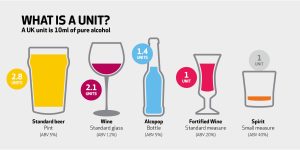Why am I so fat and cannot lose weight?
Because you eat too much (for your level of activity) +/- you drink too much (e.g. fizzy drinks, alcohol).
In this article we will tell you why you are so fat and cannot lose weight. We know you exercise. Sorry, exercise doesn’t make much difference.
You are fat as you eat too much (for your age and gender) AND drink too much alcohol (if you drink)
How many of us are fat?
Alot. ALOT alot. Obesity is a complex chronic disease that affects a significant proportion of the UK adult population. In fact 38% of adults are overweight, and 26% of are obese (House of Commons library, 2023) – yes nearly 65% (2/3rds) of us are too fat. Staggering eh!?
Being overweight and obesity are defined by body mass index (BMI), i.e. you are overweight if your BMI is >30, and obese if >40.
The problem with alcohol
Let’s not beat about the bush. Many of us drink too much, way over the NHS recommendation of 14 units a week (spread over at least 3 days).
Unfortunately alcohol is highly calorific. Its a big part of the reason why many of us are so fat.
Alcohol units are a simple way of understanding the quantity of pure alcohol in a drink.

As an example, a pint of average strength beer (4% ‘alcohol by volume’, or ABV – see below for explanation) or large glass (250 ml) of 13% wine, has over two units in it, while a single measure (25ml) of typical spirits is one unit.
Eating/drinking to maintain weight
This depends on your age and gender (see below).
Calorie requirement decreases as you get older, and men need more calories than women:
- Men aged 18-30 years need 2,500-3,000 calories per day to maintain weight
- Men aged 31-59 years need about 2,500 calories
- Men over 60 years require 2,000-2500 calories.
Gents. If you consistently eat/drink over the maximum above, you will put on weight.
These are equivalent numbers for women:
- Women aged 18-30 years need 2,000-2,500 calories to maintain weight
- Women aged 31-59 years need about 2,000 calories
- Women over 60 years require 1,500-2,000 calories.
Ladies too. If you consistently eat/drink over the maximum above, you will put on weight.
Eating/drinking to lose weight
When it comes to losing weight, a general rule of thumb is to consume 500 fewer calories than needed to maintain your present weight. So, to lose weight ..
Most men and women need to eat/drink less 2000 and 1500 calories a day respectively
Every day. Are you? really? Really really? (don’t forget that packet of biscuits in the cupboard or at work). Precisely.
Here are our: 10 top tips to help you lose weight
Are there any good calorie counting apps?
Yes. If you like the calorie counting approach, there are several simple and helpful free apps, on which you can record what you eat and drink.
https://www.mynetdiary.com/ is a good one. Record everything.
Are there any good walking apps?
Yes. The NHS Active 10 app is a good one. Even though we have said exercise is not a good way of losing weight (it isn’t, fact), a daily walk is a good way to start. We suggest the NHS Active app. Start with 10 mins of brisk walking a day and build up to 30 minutes. Then try the stairs at work!
Later on you try things like 30 mins of harder exercise 3x a week (running, cycling, swimming etc) and even build to a 5k run (NHS’s ‘Couch to 5k’).
But let’s start with some simple eating/drinking less and some walks shall we?
Note. There are medical reasons for losing weight. These are unusual.
Summary
We have explained why you are so fat and cannot lose weight. You eat/drink too much. We know you exercise alot. To lose weight, most people need to eat less than 2000 calories a day (man) and 1500 (woman). Every day. We have explained how you can do that. We hope this helps you. You CAN do it. It’s a marathon, not a sprint.
Other resources
If all else has failed, why not consider: Ozempic (semaglutide) and other GLP-1 agonists
And if that does not work, why not consider bariatric (weight loss) surgery
How much alcohol in beer or wine
10 top tips to help you lose weight
10 obesity facts and figures
Body mass index (BMI): pros and cons
5 medical reasons for not losing weight

